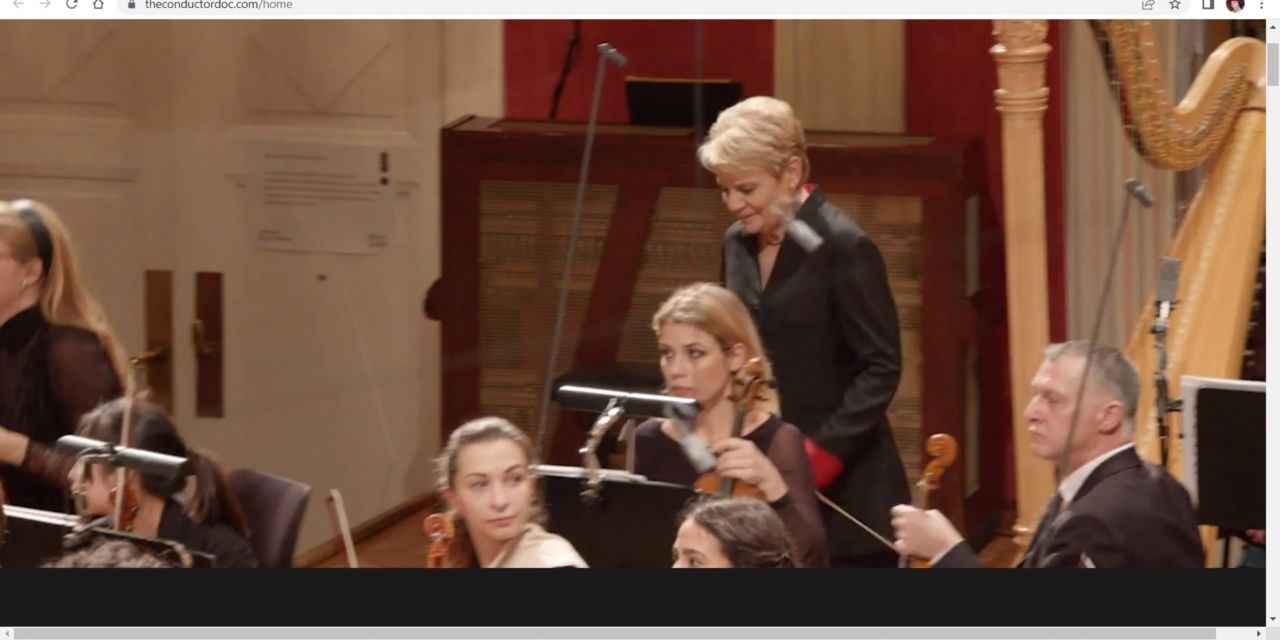According to classical music website BachTrack, in 2019 only eight of the top 100 conductors (based on how many concerts they conducted) were women. Apparently this is something we should be pleased about: in 2013 there was just one. That single woman was Marin Alsop.
New documentary The Conductor, examining Alsop’s career, gives an insight into why female conductors are so thin on the ground. One of the world’s greatest maestros (or maestras, as the Italian would have it), her journey to the top hasn’t been an easy one.
Marin Alsop’s career has been one of firsts. In 2007 she was appointed musical director of the Baltimore Symphony Orchestra, becoming the first woman to lead a major US orchestra. At that time, we learn, women were more likely to lead a G7 country or become a four-star general in the US army. Things haven’t improved much since then; Alsop retired from the position in 2021 and now there are no female leaders of a major US orchestra.
The film provides a retrospective of Alsop’s life and career. The only child of musician parents, she gravitated towards music because that’s what her parents wanted her to do. They sat her in front of the piano as soon as she could walk, she says. She hated it, but found she loved the violin: “It made me realise there’s an instrument for every child.”
The documentary follows Alsop around the world as she conducts concerts in São Paulo, Lucerne, Baltimore and Vienna. We also see her teaching at Juilliard and at home with her partner Kristin Jurkscheit and among friends.
Alsop comes across as an exceptional woman. Open and warm, but also driven and ambitious; her achievements are remarkable. She tells us how, at just nine years old, she saw Leonard Bernstein conducting and decided that was what she wanted to do, only to be told “girls can’t do that”. Later on in the film she says: “Don’t tell me I can’t do something.” That could easily be her mantra, as well as the theme to this documentary.
She was rejected from Juilliard’s conducting programme three times. At one application she was deliberately given a score with the wrong notes; at another she was told she would never be a conductor as her muscles had atrophied – she was 23.
Realising that the establishment within the world of classical music wasn’t going to give her any opportunities, she created her own. She formed String Fever, a 14-piece all-woman string swing band, in 1981 (“Having this community of women was really important because we felt supported and emboldened by each other.”) and in 1984 she persuaded Japanese financier Tomio Taki to fund Concordia, a 50-piece orchestra. Taki, who has remained a good friend and supporter of Alsop’s, is interviewed here.
Alsop recounts all this in a manner that is straightforward, honest and engaging. The insights into her private life are particularly illuminating. Jurkscheit is open about how hard their relationship has been with Alsop away so much of the time, especially when raising their son. But the love and support within the family are clear on screen.
Scenes showing her teaching are encouraging. Her style is encouraging and helpful. She talks of teachers who try to break their students. A teacher at Juilliard told her that he didn’t believe in her. She was devastated. She almost gave up classical music; it was, she says: “Too regimented. Too many rules. Too many expectations that I just didn’t like.” Lucky for us she stuck with it.
Marin Alsop takes a different approach. She doesn’t mollycoddle; if students are getting it wrong she lets them know. But her criticism is constructive and her advice is helpful and worthwhile, and when students get it right she tells them. One student says: “She’s a great teacher and she knows how to bring you out. She’s all about authenticity.”
The kickback against a woman working in this male-dominated business is both familiar and depressing. When she was being considered as director of the Baltimore Symphony in 2007, for example, a handful of musicians fabricated a letter claiming that all the musicians were against the idea.
She almost pulled out. But instead she engineered a meeting with the full orchestra and learned that in general she had their support.
It’s sobering that this kind of misogyny is still rife. But Alsop genuinely wants to give women opportunities, she wants to remove the barriers that she had to overcome. Her generosity is truly heartwarming. She talks about the Taki Alsop Alsop Fellowship, a programme to mentor, support, and promote women conductors, and describes OrchKids, the Baltimore Symphony educational programme, as the thing she is most proud of.
Marin Alsop is an inspiring woman. You can’t help but warm to her; she’s likeable, though you get the impression that she can be difficult, too – no one gets to where she is now without incredible determination. But if anyone has earned this, it’s Alsop and she is rightly proud of her achievements.
More info
Tech spec
• The Conductor, documentary
• Length: 2 hr 29 min
• Rated: U
• Available on demand on Sky Arts
• By Cargo Film and Releasing
• Director: Bernadette Wegenstein
• Released: 2021
• More: The Conductor
Verdict
Both inspiring and depressing, The Conductor provides a great insight into the hard-won career of Marin Alsop – and the exceptionally talented woman behind that career.

